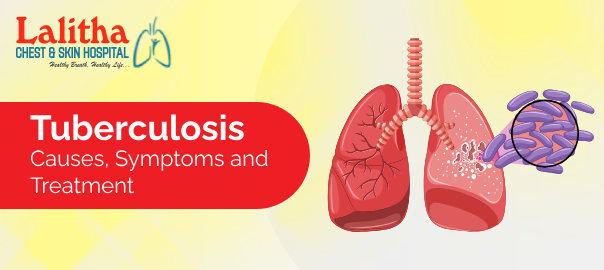Tuberculosis has been a widespread disease in India throughout its history, impacting people from all walks of life. Tuberculosis, colloquially called “TB,” is a bacterial infection that can spread from one person to another through tiny droplets when a person speaks or sneezes.
When infected, the symptoms start as cough, fatigue, weight loss, loss of appetite, and fever, and they may get severe, leading to lung damage, neurological problems, paralysis, kidney failure, and even death. Because of its contagiousness, ability to spread to other parts of the body, and cause complications, TB has become one of the top 10 causes of death worldwide.
“While it was more prevalent in the early 19th and 20th centuries, Tuberculosis has not completely disappeared even today. Even in the remote areas of Karimnagar, we regularly identify and treat tuberculosis cases. Because TB is more contagious, it becomes even more dangerous among the close-knit communities in rural areas,” says Tuberculosis specialist in Karimnagar Dr. Raj Kumar Korra at Lalitha Chest and Skin Hospital.
To improve awareness about Tuberculosis in Karimnagar, we have decided to provide brief information about this infectious disease, its causes, symptoms, and Tuberculosis treatment available today. Read on to know:
What is Tuberculosis? How does it impact the human body?
Tuberculosis (TB) is a bacterial infection primarily caused by a type of bacteria called Mycobacterium tuberculosis. This contagious disease spreads through the air when the infected person sneezes or coughs and releases tiny infection droplets into the environment.
The bacteria that reach through the droplets directly affect the lungs. Sometimes, the bacteria get buried in the deeper parts of the lungs and are controlled without adverse effects. But, in most cases, when the immune system does not prevent the bacteria, they break out and begin to cause problems in the lungs and eventually to the body’s other parts.
Symptoms of Tuberculosis and How to Identify Tuberculosis:
Persistent Cough: The bacteria causes lung infections, primarily leading to a persistent cough, which may produce phlegm and, in severe cases, blood.
Chest Pain: As the lung infection worsens, the bacteria can cause chest pain, which intensifies when one coughs or takes a deep breath.
Miscellaneous Symptoms: The TB bacteria can cause various problems, manifesting as weight loss, fever, loss of appetite, fatigue and weakness, night chills, and even sweats.
“In some cases, the TB bacteria can spread beyond the lungs, affecting different body parts. Lung nodes, kidneys, bladder, bones and joints, and organs in the abdomen are the most commonly affected areas in TB,” says Pulmonologist and TB doctor in Karimnagar, Dr. Raj Kumar Korra.
Treatment for Tuberculosis in Karimnagar:
The primary treatment for TB involves a combination of antibiotics over several months until the bacteria subsides from the system. Tuberculosis has two types: drug-sensitive, which is responsive to drugs, and drug-resistant, which is not. For drug-sensitive TB, a standard regimen includes four antibiotic medications for about two months, followed by two of these four medications for the following months. As for drug-resistant TB, the choice of medications differs, and comprehensive treatment and monitoring become essential for a more extended period.
“Throughout the treatment, careful monitoring and reporting of any side effects become mandatory, along with precautionary steps to prevent the spread of the disease,” says Dr. Raj Kumar, a Tuberculosis doctor in Karimnagar.
Causes of Tuberculosis: Why Rural Areas are More Susceptible to Tuberculosis?
Tuberculosis (TB) is caused by a bacteria called Mycobacterium tuberculosis. While the infection can happen anywhere, TB is prevalent and spreads rapidly in rural areas.
“Poor sanitation, ventilation and unhygienic living conditions increase susceptibility to this infection. These external factors, combined with a lack of proper awareness and healthcare facilities, further make TB a severe problem in rural areas of Karimnagar. Not everyone can search on Google for a ‘Tuberculosis specialist near me’ or the ‘best TB doctor near me’ to reach out to a specialist,” says a Pulmonologist and TB specialist at Lalitha Chest and Skin Hospital.
While Tuberculosis can be a severe medical condition, early identification, diagnosis, and treatment can help alleviate the symptoms and make it easy for the patient to win over this bacterial infection and curb its spread. If you are in Karimnagar and are looking for the best Tuberculosis specialist, you can consult the TB specialist in Karimnagar, Dr. Raj Kumar Korra here.


